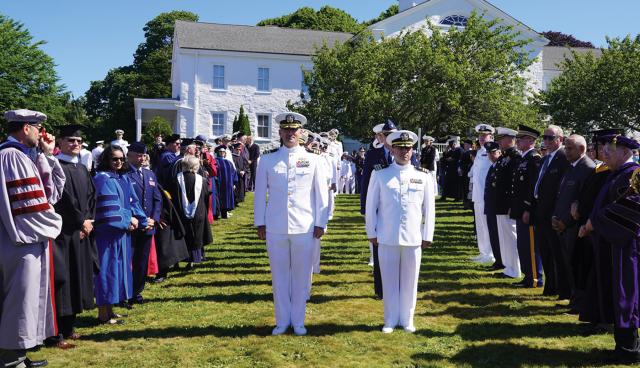Matt Wright
Navy leaders signaled the importance of in-residence graduate education for career naval officers with its 2018 policy change requiring all “officers in year group 2015 and beyond . . . to graduate from an in-residence (graduate education) program prior to assuming major command.”1 Emphasizing strategically focused graduate education harkens to the interwar period and the 1920 Knox-King-Pye report, which states: “It is considered to be to the highest interest of the government not only to provide for (continuous formal education) but to require it.”2 Furthermore, creating opportunities for advanced education is increasingly important amid calls to rebalance the Navy’s strategic culture.3
Unfortunately, prioritizing graduate education stands in stark contrast to the appeal of the junior and senior war college courses offered in Newport each year. Navy officers filled just 67 percent and 44 percent of the allotted fiscal year (FY) 2022 Naval War College (NWC) quotas for the junior and senior courses, respectively. This continues a trend of reduced interest in NWC from FY21, when just 70 percent of junior and 50 percent of senior NWC naval officer seats were filled.4 The Navy’s Education for Seapower Strategy 2020 acknowledged that “the Department of the Navy must align new education initiatives with the needs of the operating forces.”5
The NWC must adapt its delivery of strategic education programs in response to this impetus for change. COVID-19 mitigation efforts drove innovation that forms a useful framework: remote war college.
Joint Professional Military Education
Under federal law, unrestricted line officers “may not be appointed to the grade of brigadier general or rear admiral (lower half) unless the officer has been designated as a joint qualified officer (JQO).”6 The JQO requirement consists of three steps: joint professional military education I (JPME I; i.e., junior war college), JPME II (i.e., senior war college), and a tour in a qualified joint duty billet.7 Each service maintains its own junior and senior war college programs, including both in-residence and distance education options for JPME I. The National Defense University also offers various in-residence JPME II programs in Washington, D.C., and Norfolk, Virginia.
While the service schools all include distance education options for JPME I credit, they do not equate to in-residence graduate education because students complete their studies in addition to the requirements of their regular “day jobs.”8 During the COVID-19 pandemic, these institutions adapted their full-time war college courses, with students primarily participating online from their homes.9 However, the schools have returned to prepandemic norms and once again require officers to attend in-person classes.
How to Sour a Good Deal

During the COVID-19 pandemic, the Naval War College moved to a remote learning model, and its graduation rates in 2020 and 2021 were more than 99 percent. Shutterstock
A disincentive for many officers when considering attending the NWC is the requirement to relocate to Newport under permanent change of station (PCS) orders. “I don’t want to move twice in a year” is a typical refrain when eligible candidates defer their opportunity to attend war college, as in-residence programs last between 10 and 13 months.
A year of academic study ashore at an esteemed institution thus presents to many candidates as a “bad deal.” This rapid cycle of PCS-school-PCS has always been a factor, but the growing reality that Navy spouses are pursuing careers of their own makes the current war college offerings less appealing today.10 Volunteering for a course of instruction at the NWC drives a painful decision for most Navy families: uproot for a year of temporary residence in Newport or break the family apart while the service member becomes a “geographic bachelor” and the family remains in place. It does not have to be this way.
When the COVID-19 pandemic hit, the NWC adapted its operations.11 The NWC had the advantage of significant experience delivering part-time instruction through its College of Distance Education and already offered online courses leading to JPME I credit. The in-residence courses shifted to similar online formats and continued to graduate officers, despite strict restrictions against on-campus instruction.12
The November 2020 class of resident junior and senior war college students, who started their instruction in January 2020 before pandemic mitigation measures and subsequently completed most of their studies remotely, graduated 44 of 44 students.13 The NWC graduated 314 of 316 resident students (99.4 percent) during academic year 2020–21, the year most affected by the pandemic—nine students more than the subsequent year, when COVID-19 mitigations relaxed to allow traditional instruction.14
The Answer: Remote War College
The NWC should develop junior and senior war college programs to deliver its world-class educational experience to officers as full-time students without requiring them to move to Newport or hold down day jobs in the fleet. Students and instructors could refine the methods used to facilitate study during the COVID-19 pandemic to address concerns around “moving twice in a year.” Such an effort could entice a reluctant officer cadre to attend war college, alleviate a significant burden on hundreds of Navy families every year, and produce multiple collateral benefits.
Attending NWC classes from a home office in a fleet concentration area would be like the NWC Class of 2021’s experience attending from home in Newport, with the added benefits stemming from an ability to plan the transition deliberately. The Secretary of Defense signed a memo in September 2022 stating, “We remain profoundly committed to doing right by our military families,” and the Secretary of the Navy acknowledged the toll Navy spouses pay because of “frequent moves.”15 Allowing committed, due-course officers to attend remote NWC programs would represent progress toward addressing these concerns.
Additional Benefits
Besides the individual benefits to Navy families, remote war college would have several collateral benefits. First, allowing officers to remain in their previous duty stations would save costs associated with moving officers twice in a year. PCS moves to/from Newport cost an average of $15,322 each in FY22.16 Because Newport is not a fleet concentration area, graduating officers typically PCS again after graduation to rejoin the fleet, doubling that expense.
Granted, some students would have conducted one of those moves regardless of their time at the NWC (e.g., overseas to Newport to Norfolk), but many could have avoided both front- and back-end moves (e.g., Norfolk to Newport to Norfolk), thus doubling the resulting PCS cost savings. Using this very rough math, delivering remote war college to the 305 graduates in 2021–22 would have saved approximately $6 million in PCS costs.17
Because Newport is a particularly expensive housing market, the Navy also would recognize basic allowance for housing (BAH) cost savings if officers remained in their current duty stations for remote war college. Allowing officers to attend remote war college in D.C. or one of the remaining ten fleet concentration areas would result in BAH cost savings of up to thousands of dollars per officer household per month.

Students graduate from the Naval War College. Navy leaders have signaled the importance of education, but Navy slots continue to go unfilled at the Naval War College. The college should build on the success of remote learning during the COVID-19 pandemic and offer remote war college to junior and senior officers. U.S. Navy
These savings would enable another benefit: class trips to diverse locations around the world. For example, instead of studying the NWC’s significant role in pre–World War II planning from frigid Newport, students could travel in cohorts to Hawaii and learn from Admiral Chester Nimitz’s headquarters in Pearl Harbor. More important, they could then proceed to learn from contemporary planning and operational efforts at U.S. Indo-Pacific Command, located nearby at Camp H. M. Smith. A two-week temporary duty trip to Hawaii from Norfolk would cost approximately $3,817—less than a quarter of the BAH savings from avoiding a year of Newport’s especially high housing costs ($15,408 savings for an O-5 with dependents).18
Geographically dispersing the students in each NWC class also would better represent the realities of modern operational and strategic planning. Distributed maritime operations imply distributed maritime operational planning, and it is unlikely that future leaders will meet in one convenient location to prepare for a coming battle or campaign.
A similar, painful lesson was learned in 1942 after practicing “planning by conference” within the halls of the NWC between world wars. Reality came crashing down via defeats in the naval campaign around Guadalcanal, when disparate units were thrown together ad hoc without an opportunity to conduct face-to-face coordination.19 This weakness was best symbolized by the ill-timed leadership conference immediately preceding the disastrous 1942 Battle of Savo Island, which removed the commander of the Allied surface force and his flagship from the battleline just as the Japanese approached in the darkness.20 The World War II Navy rapidly evolved its coordination efforts to allow remote operational planning—the same type of environment that would be facilitated by shifting to remote war college.21
Remote war college also could help the Navy retain women. According to the Department of Defense 2020 Demographics report, 42.8 percent of women in the Navy are married to fellow service members.22 Allowing students to remain in their current geographic locations while attending war college would remove one obstacle for these families to continue dual naval careers. They could remain colocated and simultaneously preserve an offset sea-duty/shore-duty rotation with their spouse. As an example, one spouse could attend NWC remotely while the other serves a milestone sea duty tour before subsequently swapping roles—all while living in the same home and allowing one service member to remain ashore to care for their children.
Remote war college also could help female officers balance their career progression. As pregnant women are not eligible for operational assignments, remote war college could offer new mothers a due-course option to progress their careers ashore instead of marking time in staff duty.23
The Arguments Against Change
Much of the learning and professional growth associated with in-residence war college takes place outside the classroom.24 Informal discussions regarding the curriculum provide context and depth to the formal course of instruction. Furthermore, the relationships formed among students often endure long after graduation and pay dividends for both the individuals and the Navy. This is especially true when considering the 100–150 foreign officers who attend the NWC in Newport each year.25 Remote war college could degrade these important human connections if improperly managed.
However, these relationships could just as easily flourish outside Newport. Class trips could help form bonds through travel. Also, transitioning to remote war college through geographic cohorts would foster personal interactions between students. Classmates could form groups in fleet concentration areas without moving to Newport. Foreign students could join one of those cohorts, and all involved would continue to enjoy the benefits of personal interaction with peers, while still avoiding the dreaded two moves in a year.
Online security concerns would present a challenge. Providing access to classified material and collaboration tools will require additional investment—especially regarding wargaming and sensitive strategy development. Fortunately, the Naval War College Strategic Plan 2022–2027 already began work developing “a robust and sustainable technical capability to conduct virtual and hybrid educational activities in unclassified and classified environments (NLT June 2022).”26 Students could complete the few courses requiring access to classified systems via periodic travel to Newport until the virtual classified environment is ready.
Finally, there likely are officers who prefer temporary residency in Newport to their current or future duty stations. Providing students with the option to join a Newport cohort would not realize any cost savings, but it would serve as a test to validate the premise that many prime NWC candidates prefer remote course work. Students could simply vote with their feet.
No comments:
Post a Comment